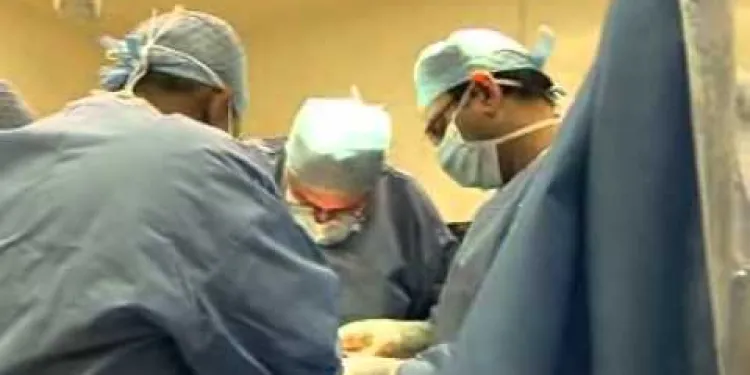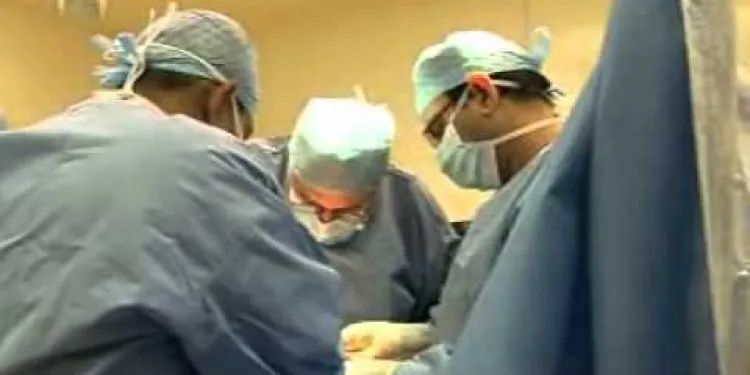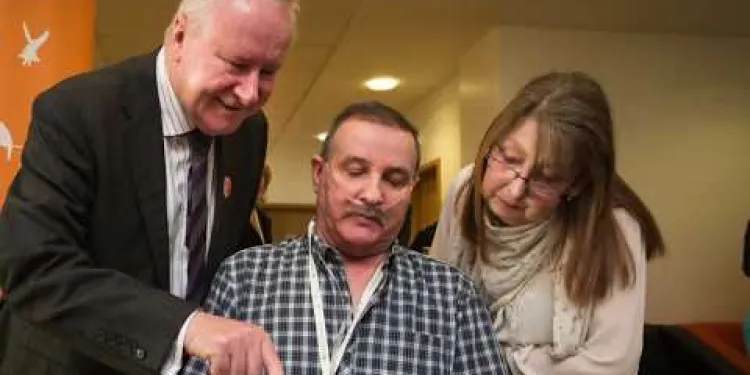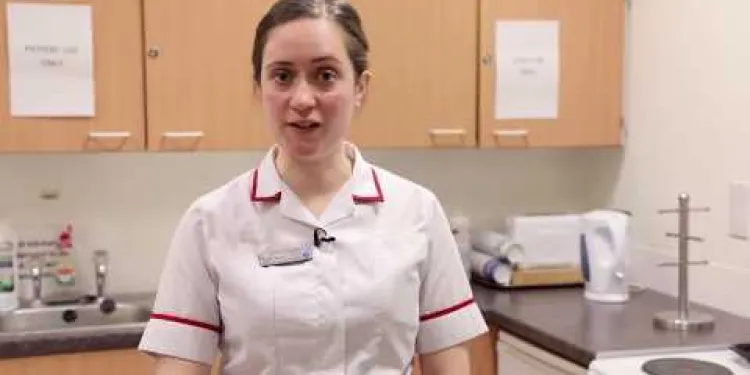Find Help
More Items From Ergsy search
-

Liver transplant - Patient experience - Part 1 (Colin)
Relevance: 100%
-

Liver transplant - Patient experience - Part 2 (Lynne)
Relevance: 98%
-

Cornea transplant patient Information
Relevance: 52%
-

Patient Stories - Having a kidney transplant
Relevance: 51%
-

Liver disease | NHS
Relevance: 49%
-

Heart-lung transplant patient shares her story
Relevance: 47%
-

Are hair transplants in Turkey safe?
Relevance: 42%
-

Having a kidney transplant
Relevance: 42%
-

Hair Transplants in Turkey
Relevance: 41%
-

Bernard's Story - Lung Transplant
Relevance: 40%
-

What is the cost of a hair transplant in Turkey?
Relevance: 39%
-

Cornea transplant - Your journey
Relevance: 38%
-

What are the risks associated with hair transplants in Turkey?
Relevance: 38%
-

Is language a barrier for a hair transplant in Turkey?
Relevance: 37%
-

What techniques are used for hair transplants in Turkey?
Relevance: 36%
-

Matthew's Story: Kidney Transplant - Part 1
Relevance: 35%
-

Kidney transplant waiting stories – DJ Ace and Lauren | NHS Organ Donation
Relevance: 35%
-

How should I prepare for a hair transplant in Turkey?
Relevance: 34%
-

How long should I stay in Turkey for my hair transplant?
Relevance: 33%
-

Mark Lancaster Patient Experience Leeds Endoscopy
Relevance: 33%
-

Will I need a follow-up visit after my hair transplant in Turkey?
Relevance: 33%
-

Sickle cell patients share their experiences with the last NHS Chief Executive Amanda Pritchard
Relevance: 30%
-

Do I need a visa for a hair transplant in Turkey?
Relevance: 25%
-

Exercise in patients with a neuropathy
Relevance: 23%
-

What are some common reasons blood transfusions are needed?
Relevance: 23%
-

Stroke - Speech and Language Therapist's Experience
Relevance: 22%
-

Neuroendocrine tumour patient video
Relevance: 22%
-

Positioning for Breathless Patient
Relevance: 22%
-

How soon can I return to work after a hair transplant in Turkey?
Relevance: 21%
-

How important is work experience for entering a nursing program?
Relevance: 21%
-

What are the common side effects of Abiraterone?
Relevance: 21%
-

Can online patient forums provide reliable information on waiting times?
Relevance: 21%
-

Can technology aid in the care of Alzheimer's patients?
Relevance: 21%
-

Can fathers experience postnatal depression?
Relevance: 20%
-

Is prior experience required to work at the National Trust?
Relevance: 20%
-

Are there online support services for prostate cancer patients on the NHS?
Relevance: 20%
-

What support is available for carers of Alzheimer's patients?
Relevance: 20%
-

Paolo Fattore Aquablation Patient Testimonial
Relevance: 20%
-

What should I do if I experience problems with my Turkey Teeth?
Relevance: 20%
-

Assessing the stroke patient
Relevance: 20%
Liver Transplant - Patient Experience - Part 2 (Lynne)
Pre-Transplant Preparation and Anxiety
Lynne's journey towards a liver transplant was filled with both hope and anxiety. After being diagnosed with liver cirrhosis, her doctors at one of the UK's leading transplant centres advised her to undergo a liver transplant. The time leading up to the operation was marked by rigorous evaluations, including blood tests, imaging scans, and interviews to assess her suitability for the procedure. Lynne recalls feeling overwhelmed but was comforted by the thorough explanations provided by her healthcare team.The Day of the Surgery
The day of Lynne's transplant was a mixture of anxiety and relief. She recalls waking up early in the morning, knowing that this day could change the rest of her life. The transplant team at the hospital was incredibly supportive, making sure she was informed and comfortable before the procedure. Lynne’s surgery lasted several hours, during which she was under the care of some of the best surgeons and healthcare professionals in the country.Post-Transplant Recovery
Recovery in the hospital was a challenging phase for Lynne. For the first few days, she was in the intensive care unit, closely monitored by a team of specialists. The physical pain was accompanied by a constant battle to stay mentally strong. However, consistent support from the medical staff and regular visits from family members played a crucial role in her recovery. Lynne was also introduced to a physiotherapist who helped her start moving and regain her strength gradually.Lifestyle Adjustments and Medications
Adjusting to a new lifestyle post-surgery was significant for Lynne. She had to adhere to a strict regimen of immunosuppressive medications to prevent her body from rejecting the new liver. Regular follow-up appointments became a norm, ensuring her new liver was functioning well and allowing for early detection of any potential issues. Lynne also made dietary adjustments and incorporated regular light exercise into her routine to maintain her health.Emotional and Psychological Support
The emotional toll of a liver transplant can be substantial, and Lynne found it beneficial to seek psychological support. She joined a local support group for transplant patients, which provided a safe space to share experiences and coping strategies. Additionally, Lynne accessed counseling services offered by her transplant centre, which helped her navigate the emotional highs and lows of her recovery journey.Gratitude and Reflection
Looking back, Lynne reflects with immense gratitude towards her donor and their family, whose generous gift gave her a second chance at life. She also appreciates the dedicated medical professionals and the unwavering support of her family and friends. Today, Lynne encourages others undergoing a similar journey, reminding them that while the path may be tough, the outcome is worth the struggle. Her story is a testament to the resilience of the human spirit and the life-changing impact of organ donation.Liver Transplant - Patient Experience - Part 2 (Lynne)
Getting Ready for the Transplant
Lynne needed a liver transplant. This scared her, but she was also hopeful. She had liver cirrhosis, and her doctors said she needed a new liver. Before the operation, Lynne had many tests. These included blood tests and scans. The doctors also talked to her to make sure she was ready. Lynne felt a bit overwhelmed, but her doctors explained everything clearly, which made her feel better.The Day of the Surgery
The day of the surgery made Lynne feel both nervous and relieved. She woke up early, knowing this was an important day. The hospital team was very supportive. They made sure she felt informed and comfortable. The surgery took several hours. During this time, Lynne was cared for by very skilled doctors and nurses.Getting Better After Surgery
After the surgery, Lynne stayed in the hospital to get better. At first, she was in the intensive care unit, where she was watched closely. She felt physical pain and tried her best to stay strong in her mind. The doctors, nurses, and her family visited her, which helped a lot. A physiotherapist helped Lynne start moving again and regain her strength bit by bit.Living After the Transplant
After the surgery, Lynne had to change her lifestyle. She took special medications every day to make sure her body did not reject the new liver. Lynne went to regular doctor visits to make sure everything was okay. She also changed her diet and started doing light exercise to stay healthy.Feeling and Emotional Support
Getting a liver transplant was also hard on Lynne's feelings. She got help by joining a support group for people who had transplants. There, she talked about her feelings and learned how to cope. Lynne also went to counseling offered by her transplant center. This helped her handle the ups and downs of her journey.Saying Thank You and Looking Back
Lynne feels very thankful. She thanks her donor and their family for their kind gift. This gift gave her a new chance at life. She also thanks the doctors, nurses, and her family and friends for their help. Lynne encourages others facing the same journey, reminding them that even though it's hard, it's worth it. Her story shows how strong people can be and how organ donation can change lives.Frequently Asked Questions
What is the typical waiting time for a liver transplant in the UK?
The waiting time for a liver transplant can vary widely depending on the patient's condition, blood type, and urgency. It can range from a few weeks to several months.
Are there any dietary restrictions before and after a liver transplant?
Before a transplant, it’s crucial to maintain a balanced diet to stay as healthy as possible. After the transplant, dietary restrictions may include limiting salt, sugar, and avoiding alcohol. Your healthcare team will provide specific guidelines.
What kinds of follow-up care are required after a liver transplant?
Follow-up care includes regular check-ups, blood tests, liver function tests, and monitoring for signs of transplant rejection or infection. Frequent visits to the transplant clinic are necessary initially, which may become less frequent over time.
How long does the liver transplant surgery take?
The liver transplant surgery typically lasts between 6 to 12 hours. The duration can vary depending on the complexity of the surgery and the patient's condition.
What medications will I need to take after a liver transplant?
After a liver transplant, patients must take immunosuppressive medications to prevent their body from rejecting the new liver. These medications are typically required for the rest of the patient's life.
What are the potential risks and complications of liver transplant surgery?
Risks and complications can include infection, bleeding, blood clots, bile duct complications, rejection of the new liver, and side effects from immunosuppressive medications.
Can I return to work after a liver transplant?
Many patients can return to work after a liver transplant. The time frame varies, but it generally takes several months to a year. The decision depends on the patient's recovery progress and the nature of their work.
Will I experience pain after the liver transplant surgery?
Pain is common after liver transplant surgery but is usually manageable with pain relief medications. The level of pain typically decreases significantly as the patient heals over time.
How do I manage my mental health after a liver transplant?
Managing mental health is crucial. This can involve counseling, support groups, and communicating openly with family and healthcare providers to address anxiety, depression, or stress.
Are there any financial considerations for a liver transplant in the UK?
In the UK, liver transplants are covered by the NHS, so direct costs for the surgery and follow-up care are generally covered. However, patients may need to consider ancillary costs such as transportation, accommodation for family members, and loss of income during recovery.
Will I need to adopt any lifestyle changes after a liver transplant?
Yes, lifestyle changes are often necessary. This includes maintaining a healthy diet, avoiding alcohol and tobacco, staying physically active, and regularly monitoring your health as per your doctor's advice.
What should I do if I suspect my body is rejecting the new liver?
If you suspect rejection, which may present as fever, jaundice, dark urine, or light-colored stools, you should contact your transplant team immediately for evaluation and possible adjustment of your medication.
Is it possible to live a normal life after a liver transplant?
Many liver transplant recipients go on to live healthy and active lives after recovery. Adherence to medical advice, medication regimens, and lifestyle adjustments play a key role in the long-term success of the transplant.
How can family members support someone who has had a liver transplant?
Family members can support by providing emotional support, assisting with daily activities during recovery, attending medical appointments, and encouraging adherence to medication and lifestyle recommendations.
What signs should be closely monitored after a liver transplant?
Signs to monitor include fever, jaundice, abnormal liver function tests, pain or swelling at the transplant site, and signs of infection. Regular communication with your healthcare team is vital for timely intervention.
How long do people wait for a new liver in the UK?
People often wait for a new liver. This time can be different for each person.
Many people wait for about 6 months to get a new liver.
You can look at the NHS website for more help. Ask a doctor for more information.
How long you wait for a new liver can be different for each person. It depends on how sick you are, your blood type, and how quickly you need a new liver. You might wait a few weeks or wait many months.
Here's an idea to help understand: You can use pictures or charts. These can make it easier to see and remember how long things take.
Can I eat anything before and after a liver transplant?
Before and after a liver transplant, some foods might not be safe. It's good to eat healthy foods. Eating well can help you get better.
Here are some tips to help:
- Ask your doctor or nurse what you should eat.
- Try to eat fruits and vegetables.
- Drink plenty of water.
- Avoid foods that are not cooked all the way.
Talking with a dietitian can be very helpful! They can tell you what foods are good for you.
Before you get a transplant, it's important to eat healthy food. This helps you stay strong. After the transplant, you might need to eat less salt and sugar. You should also avoid alcohol. Your doctors and nurses will tell you exactly what to eat.
If reading is hard, try using audiobooks or picture books. These can make the information easier to understand.
What care do you need after a liver transplant?
After you get a new liver, you need special care to stay healthy. Here are some things you might need to do:
- Visit the doctor often for check-ups.
- Take medicines every day as the doctor says.
- Eat healthy food to help your body heal.
- Talk to a nurse or doctor if you feel sick.
These steps help your new liver work well and keep you feeling good.
After your transplant, you need to go to the doctor often. They will check your blood, see how your liver is working, and look for any problems. At first, you will go see the doctor a lot, but later, you won't have to go as often.
Some tools and techniques that can help you remember your doctor visits are using a calendar to mark important dates and setting reminders on your phone.
How long does a liver transplant surgery take?
A liver transplant surgery can take a long time. Usually, it takes about 6 to 12 hours. This is a big surgery.
If you or someone you know is having a liver transplant, you might want to:
- Talk to a doctor. They can answer questions.
- Use a timer. It can help you keep track of time.
- Have a support person with you. They can help you stay calm.
Liver transplant surgery takes about 6 to 12 hours. The time can be different. It depends on how difficult the surgery is and how the patient is feeling.
What medicine do I need to take after a liver transplant?
After getting a new liver, people have to take special medicine. This medicine helps their body accept the new liver. They need to take this medicine every day, for their whole life.
What can go wrong with liver surgery?
A liver surgery is an important operation. Here are some things that can go wrong:
- Infection: Sometimes, germs can get in and make the body sick.
- Bleeding: Blood might flow a lot, which can be dangerous.
- Rejection: The body might not like the new liver and try to get rid of it.
- Complications: Other parts of the body might not work well after surgery.
It's important to talk to the doctor and ask questions. They can explain more and help keep you safe. You can also use pictures to understand better or ask a helper to explain things. Remember, doctors and nurses are there to help you.
Problems can happen after a liver transplant. These problems might be:
- Getting an infection (this means getting sick because of germs).
- Bleeding (this means losing too much blood).
- Blood clots (this means blood gets stuck and can't flow properly).
- Trouble with the bile duct (this is a part of your body that helps with digestion).
- The body might not accept the new liver (this is called rejection).
- Medicines that stop the body from rejecting the liver might have side effects (side effects are other problems caused by medicine).
To help understand this better, you can:
- Ask a doctor to explain.
- Use pictures or simple stories.
Can I go back to work after getting a new liver?
Yes, many people can go back to work after a liver transplant. You will need time to get better and feel strong again. Talk to your doctor to find out when it's safe to work.
Here are some tips if you're thinking about going back to work:
- Ask your doctor what's best for you.
- Start with light work and slowly do more.
- Make sure your workplace is safe and not too hard to do.
- Use tools like planners to remember tasks.
It's important to take care of yourself and only work when you feel ready.
Lots of people can go back to work after having a liver transplant. It can take a few months to a year. How fast you can go back depends on how well you are getting better and what kind of work you do.
Will I feel pain after liver transplant surgery?
You might feel some pain after the surgery. The doctors will help with pain medicine.
If you feel worried, you can talk to your doctor or nurse. They can answer your questions.
Using pictures or videos might help you understand more about the surgery.
After liver transplant surgery, it is normal to feel pain. But don't worry, doctors can give you medicine to help with the pain. As you get better, the pain will get less and less.
How can I take care of my feelings after getting a new liver?
Getting a new liver is a big change. It's normal to feel worried, sad, or scared. Here are some simple ways to help:
- Talk to someone: Share how you feel with a friend, family member, or doctor.
- Write it down: Keep a diary of your feelings. It can help you understand them better.
- Relax: Try deep breathing, listening to music, or drawing. These can help you feel calm.
- Stay Active: Go for a walk or do gentle exercise. Moving your body can make you feel happy.
- Sleep well: Try to go to bed at the same time every night. Good sleep helps your mood.
- Ask for help: See a counselor or join a support group. They can help you feel better.
Taking care of your feelings is very important. You can talk to someone who listens, like a counselor. You can also join groups where people support each other. It helps to talk to your family and doctors if you feel worried, sad, or stressed.
Do you need to pay for a liver transplant in the UK?
In the UK, the NHS pays for liver transplants. This means you don't have to pay for the surgery or care afterwards. But you might need to pay for other things like getting to the hospital, places for your family to stay, and money you might lose if you can't work while getting better.
Will I need to change how I live after getting a new liver?
If you get a new liver, you might need to change some things in your life.
Here are some easy tips to help you:
- Eat healthy food. Fruits and veggies are good for you.
- Take your medicine exactly how the doctor says.
- Exercise a little every day, like walking or light sports.
- Go to regular check-ups with your doctor.
- If you have questions or feel unsure, talk to your doctor or a nurse. They are there to help you.
Remember, these changes can help you stay healthy after your new liver. You can use apps or alarms to remind you to take medicine and go to doctor appointments.
Yes, it is important to make changes to how you live. This means eating healthy food, not drinking alcohol or smoking, exercising, and checking your health often like your doctor says.
What should I do if I think my new liver is not working well?
If you think your body is not happy with the new organ you got, it is important to tell your doctor quickly. Signs that something is wrong might be if you get a fever, yellow skin or eyes, very dark pee, or light-colored poop. Talk to your transplant team right away so they can check and help you feel better. They might need to change your medicine.
Can someone live a normal life after getting a new liver?
Yes, people can live a normal life after getting a new liver. Doctors help take care of them.
Here are some ways to help:
- Take all the medicine the doctor gives you.
- Visit the doctor for check-ups.
- Eat healthy foods and exercise.
Using pictures and asking someone for help can make it easier to understand.
Many people who get a new liver can live happily and do lots of activities after they get better. It is very important to follow the doctor's advice, take the right medicines, and make some changes to how you live to stay healthy for a long time.
How can family help someone who had a new liver?
Family can help in many ways. Here are some tips:
- Listen to them and be there when they need you.
- Help them remember doctor visits and take medicine on time.
- Cook healthy food and encourage rest.
- Learn about transplants so you can understand what they are going through.
- Be patient and kind. Getting better takes time.
Using tools like a calendar or a pill box can help them keep track of what they need to do.
Family can help by giving love and support, helping with daily tasks, going to doctor visits, and reminding to take medicine and follow doctor's advice.
What signs should you watch for after a liver transplant?
Things to watch out for include a high temperature (fever), yellow skin or eyes, unusual liver test results, pain or swelling where the transplant happened, and signs of infection. It is very important to talk to your doctor or nurse often so they can help if there is a problem.
Useful Links
Have you found an error, or do you have a link or some information you would like to share? Please let us know using the form below.
-->
This website offers general information and is not a substitute for professional advice.
Always seek guidance from qualified professionals.
If you have any medical concerns or need urgent help, contact a healthcare professional or emergency services immediately.
Some of this content was generated with AI assistance. We’ve done our best to keep it accurate, helpful, and human-friendly.
- Ergsy carfully checks the information in the videos we provide here.
- Videos shown by Youtube after a video has completed, have NOT been reviewed by ERGSY.
- To view, click the arrow in centre of video.
- Most of the videos you find here will have subtitles and/or closed captions available.
- You may need to turn these on, and choose your preferred language.
- Go to the video you'd like to watch.
- If closed captions (CC) are available, settings will be visible on the bottom right of the video player.
- To turn on Captions, click settings .
- To turn off Captions, click settings again.
More Items From Ergsy search
-

Liver transplant - Patient experience - Part 1 (Colin)
Relevance: 100%
-

Liver transplant - Patient experience - Part 2 (Lynne)
Relevance: 98%
-

Cornea transplant patient Information
Relevance: 52%
-

Patient Stories - Having a kidney transplant
Relevance: 51%
-

Liver disease | NHS
Relevance: 49%
-

Heart-lung transplant patient shares her story
Relevance: 47%
-

Are hair transplants in Turkey safe?
Relevance: 42%
-

Having a kidney transplant
Relevance: 42%
-

Hair Transplants in Turkey
Relevance: 41%
-

Bernard's Story - Lung Transplant
Relevance: 40%
-

What is the cost of a hair transplant in Turkey?
Relevance: 39%
-

Cornea transplant - Your journey
Relevance: 38%
-

What are the risks associated with hair transplants in Turkey?
Relevance: 38%
-

Is language a barrier for a hair transplant in Turkey?
Relevance: 37%
-

What techniques are used for hair transplants in Turkey?
Relevance: 36%
-

Matthew's Story: Kidney Transplant - Part 1
Relevance: 35%
-

Kidney transplant waiting stories – DJ Ace and Lauren | NHS Organ Donation
Relevance: 35%
-

How should I prepare for a hair transplant in Turkey?
Relevance: 34%
-

How long should I stay in Turkey for my hair transplant?
Relevance: 33%
-

Mark Lancaster Patient Experience Leeds Endoscopy
Relevance: 33%
-

Will I need a follow-up visit after my hair transplant in Turkey?
Relevance: 33%
-

Sickle cell patients share their experiences with the last NHS Chief Executive Amanda Pritchard
Relevance: 30%
-

Do I need a visa for a hair transplant in Turkey?
Relevance: 25%
-

Exercise in patients with a neuropathy
Relevance: 23%
-

What are some common reasons blood transfusions are needed?
Relevance: 23%
-

Stroke - Speech and Language Therapist's Experience
Relevance: 22%
-

Neuroendocrine tumour patient video
Relevance: 22%
-

Positioning for Breathless Patient
Relevance: 22%
-

How soon can I return to work after a hair transplant in Turkey?
Relevance: 21%
-

How important is work experience for entering a nursing program?
Relevance: 21%
-

What are the common side effects of Abiraterone?
Relevance: 21%
-

Can online patient forums provide reliable information on waiting times?
Relevance: 21%
-

Can technology aid in the care of Alzheimer's patients?
Relevance: 21%
-

Can fathers experience postnatal depression?
Relevance: 20%
-

Is prior experience required to work at the National Trust?
Relevance: 20%
-

Are there online support services for prostate cancer patients on the NHS?
Relevance: 20%
-

What support is available for carers of Alzheimer's patients?
Relevance: 20%
-

Paolo Fattore Aquablation Patient Testimonial
Relevance: 20%
-

What should I do if I experience problems with my Turkey Teeth?
Relevance: 20%
-

Assessing the stroke patient
Relevance: 20%


